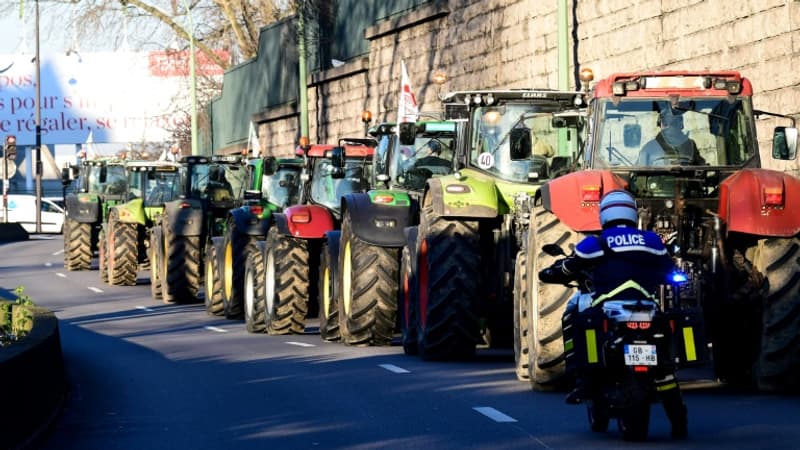“They put more obstacles on us and tell us ‘out of this'”: perched on their tractors, hundreds of farmers marched this Wednesday in Paris against restrictions on the use of pesticides and other obligations, a first for more than three years.
Hundreds of machines, sometimes weighing more than seven tons, set out from the Porte de Versailles, supervised by many policemen, to line up in five rows between the Alexandre III bridge and the Invalides, in the center.
“Coming to Paris by tractor inflates me. People are happy to see us but (…) they buy foreign products that do not respect our standards (…) they do not want to pay more”, impatient. Mathieu Beaudoin, 38-year-old grain farmer, aboard his tractor jolted over cobblestones, the Eiffel Tower in view.
425 kilometers of traffic jams
Trigger for the mobilization: the government’s decision on January 23 to renounce authorizing neonicotinoid insecticides for sugar beet cultivation, following a decision by the Court of Justice of the European Union.
For several months now, farmers have denounced at the local level the increase in their costs due to the rise in energy prices or demand to be able to store irrigation water.
His last major mobilization, for snail operations on the ring road, dates back to November 2019, to denounce the tightening of regulations regarding the spread of synthetic pesticides.
After a peak of 425km of traffic jams in the Paris region at around 9am, cumulative traffic jams were only slightly above their late-morning average on this day of the SNCF strike.
Grégoire Bouillant, a 40-year-old cereal farmer who claims to be part of “reasoned” agriculture, left his farm in Val-d’Oise around 5 am to arrive, at 20 km / h, at Porte de Versailles, where the International Agricultural Fair will be held in less than a month.
He denounces “environmental pressure” and “measures that continue to accumulate.” On the back of his tractor, a sign “Macron liar, yes to NNI (neonicotinoids, editor’s note), yes to French sugar.”
“We want to show the government that we cannot ban the means of production without an alternative,” adds Cyrille Milard, president of FDSEA 77.
FNSEA and Young Farmers flags and posters “my work respects nature, stop abusive ecologies” flourished in the windows of the tractors and many passers-by took photos of the event, along with about thirty elected officials, including the president of Hauts-de -France. Xavier Bertrand.
On a platform-like container, lined with straw bales and crates of apples, the FNSEA general secretary described “today’s fight” as “only” to “save” the productions.
Thursday meeting at the ministry
The Minister of Agriculture, Marc Fesneau, received a delegation from the event in the morning “to discuss the challenges they face and the future of the agricultural sectors,” according to a press release. He will bring together the beet sector on Thursday to “present a plan of action and support in response to the European decision.”
Neonicotinoids, toxic to bees and banned since 2018, had benefited from an exemption for two years. This allowed them to be applied preventively to beetroot seeds to protect them from jaundice, spread by aphids.
“As a neonicotinoid user, I don’t feel like I’m poisoning the world,” says farmer and union activist Damien Greffin.
He chairs the FNSEA section of the Parisian Grand Bassin, which brings together 12 cereal departments in the north of France, and is behind the initiative of the demonstration, with the CGB beetroot union, affiliated with the FNSEA, which has called for a mobilization until February 20 in all France.
The Campesino Confederation, the third union, deplored that some are demonstrating “to continue using neonicotinoids and reject any ecological progress.”
The environmental NGO Générations Futures, for its part, denounced practices “worthy of the agriculture of the 1960s, not that of 2020.”
Source: BFM TV


